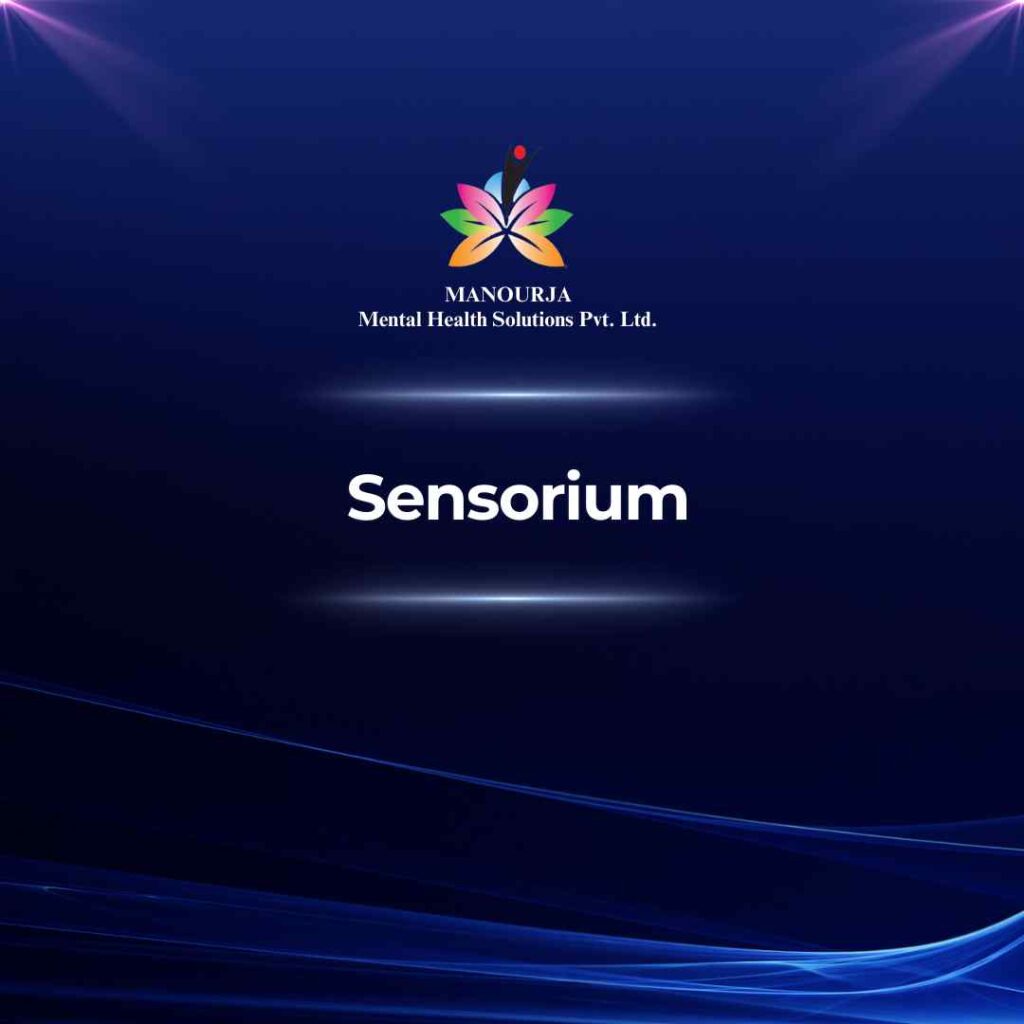Sensorium

The term “sensorium” refers to the sum of an individual’s sensory apparatus, including the brain and the central nervous system, responsible for receiving, processing, and interpreting sensory information. It encompasses the ability to perceive and respond to sensory stimuli from the environment.
Sensorium as a Sign and Symptom of Mental Illness
When discussing sensorium in the context of mental health, it often refers to the overall state of consciousness and alertness, including awareness of oneself and the environment. Altered sensorium indicates changes or disturbances in consciousness, which can range from confusion and disorientation to complete unresponsiveness. An altered sensorium is a critical sign of various mental health conditions and neurological disorders and often indicates an underlying issue that needs immediate attention.
Mental Illnesses with Altered Sensorium as Symptoms
- Delirium: Delirium is characterized by a sudden change in attention and awareness, leading to confusion, disorientation, and impaired cognitive function. Patients with delirium often experience fluctuating levels of consciousness, which is a direct indication of an altered sensorium.
- Dementia: In the later stages of dementia, individuals may exhibit altered sensorium, including confusion, disorientation, and difficulty recognizing familiar people or places. This decline in sensorium is a sign of severe cognitive impairment.
- Schizophrenia: Individuals with schizophrenia may experience disruptions in their sensorium, such as hallucinations and delusions, which distort their perception of reality. While their level of consciousness may remain intact, their interpretation and response to sensory stimuli are significantly altered.
- Substance Use Disorders: Acute intoxication or withdrawal from substances like alcohol, drugs, or medications can lead to an altered sensorium. Symptoms may include confusion, hallucinations, and impaired consciousness.
- Traumatic Brain Injury (TBI): Individuals who have suffered a traumatic brain injury may experience changes in their sensorium, including confusion, disorientation, and fluctuating levels of consciousness, depending on the severity of the injury.
- Severe Infections: Conditions like encephalitis or sepsis can affect the brain and lead to an altered sensorium. Symptoms may include confusion, decreased awareness, and impaired cognitive function.
- Mood Disorders: Severe episodes of depression or mania, particularly in bipolar disorder, can sometimes affect an individual’s sensorium. This might manifest as decreased awareness of their surroundings or impaired judgment.
Managing and Treating Altered Sensorium
Addressing altered sensorium involves identifying and treating the underlying cause. This can include:
- Medical Evaluation: A thorough medical assessment is essential to determine the cause of altered sensorium, which may involve blood tests, brain imaging, and other diagnostic procedures.
- Medication: Depending on the underlying condition, medications may be prescribed to manage symptoms. For example, antipsychotics for schizophrenia, mood stabilizers for bipolar disorder, or antibiotics for infections.
- Supportive Care: Ensuring a safe and supportive environment is crucial for individuals with altered sensorium. This may involve monitoring vital signs, maintaining hydration and nutrition, and preventing injury.
- Psychotherapy: For conditions like schizophrenia or mood disorders, psychotherapy can help individuals manage symptoms and improve their cognitive function and awareness.
- Rehabilitation: For those recovering from a traumatic brain injury, rehabilitation therapies, including physical, occupational, and speech therapy, can help restore cognitive and sensory functions.
By addressing the underlying causes of altered sensorium and implementing appropriate treatments, individuals can improve their level of consciousness, cognitive function, and overall quality of life.
At MANOURJA, we believe in the transformative power of counseling. Our experienced therapists offer a safe and supportive space where you can explore your thoughts, emotions, and challenges. Through personalized counselling sessions, we’ll work together to develop coping strategies, build resilience, and achieve lasting positive change. Discover the path to a healthier, happier you with MANOURJA counselling services.
MANOURJA Rehabilitation Services
At MANOURJA, we’re dedicated to helping you in rebuild your life, after difficult times. Our rehabilitation services focus on understanding what you need to move forward, whether you’re recovering from addiction, trauma, or any psychological – social challenges. We create personalized plans, that are all about helping you, regain your strength and find hope again. With a caring team by your side, you’ll have the support to make real progress and take steps toward a brighter, healthier future.
